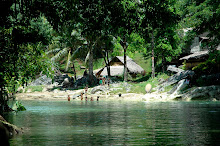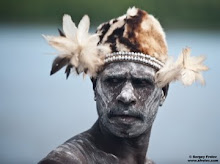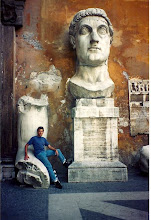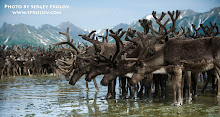 33 deg Celcius sun, but our tourist laps are nothing like the conquering emperors of China. The back story behind Xi’an’s terracotta warrior army, for example, is positively alarming. Having conquered a swag of nations and united these under one flag, the Qin ruler (about 2300 B.C.) became consumed with his omnipotence. Obsessed with living and ruling forever, China’s first emperor, swaggering around in the pretty green hills of what is now called Shaanxi province, focused a great deal of his courtiers and medicine men’s attention of finding him an elixir of youth. (Some fixations are common, whatever the era, it would appear.)
33 deg Celcius sun, but our tourist laps are nothing like the conquering emperors of China. The back story behind Xi’an’s terracotta warrior army, for example, is positively alarming. Having conquered a swag of nations and united these under one flag, the Qin ruler (about 2300 B.C.) became consumed with his omnipotence. Obsessed with living and ruling forever, China’s first emperor, swaggering around in the pretty green hills of what is now called Shaanxi province, focused a great deal of his courtiers and medicine men’s attention of finding him an elixir of youth. (Some fixations are common, whatever the era, it would appear.)While his Taoist advisers subsequently concocted a mercury-laced brew that ultimately brought about a painful, prolonged death, the brutally powerful Emperor rallied some 20,000 of his slaves to build him a mausoleum that, still today, in 2010 AD, takes your breath away in terms of scale and detail. The catacombs cover roughly 50 square kilometres in some of the prettiest Chinese countryside I’ve seen so far, and entombed some 8,000 life-size soldiers (infantry, cavalry and charioteers) fashioned from clay moulds, baked at scorching temperatures and hardened, then painted.
As if all this wasn’t sufficiently back-breaking, the somewhat paranoid Emperor felt compelled to recreate his life above-ground for the afterlife, so that when he finally fell off his perch, he also had killed for good measure, the legions of slaves that had built him his underground Empire. And his piece de resistance? Throwing in,
 for seductive company, his still-alive concubines. Such scale of self-serving cruelty, to me, is frankly horrifying.
for seductive company, his still-alive concubines. Such scale of self-serving cruelty, to me, is frankly horrifying.Whether the first or the last, or in-between, China’s emperors all had rollercoaster lives of unprecedented scale. In Xi’an, we also visited the Hot Springs Winter Palace of another Emperor who lived roughly 700 years ago. He fell in love with a concubine so beautiful it was said that flowers were shy to bloom in her presence for fear of being upstaged. The Emperor was so besotted that he was ordered by his generals and advisers to kill his concubine; instead, she fled to Japan where her descendants there still lay claim to imperial lineage. The tragic love of the emperor and his concubine is China’s own ‘Romeo and Juliet’.
And so, in the Chinese way where fable, fairytale and archaeological fact interweave to tell the story of a nation that dates as far back as Rome, Athens and Mesopotamia, thousands of travellers from all over the world hear the stories that have led China to be the superpo
 wer hothouse it is today. (Yesterday, Xi’an’s average 10,000 visitors to the First Emperor’s tomb swelled to 20,000, thanks to a three-day dragon boat festival). The heat from the sheer press of human bodies in the largest of the tomb’s sections was stultifying!
wer hothouse it is today. (Yesterday, Xi’an’s average 10,000 visitors to the First Emperor’s tomb swelled to 20,000, thanks to a three-day dragon boat festival). The heat from the sheer press of human bodies in the largest of the tomb’s sections was stultifying!There’s a funny story about the discovery, made only as recently as the early 1980s, of the terracotta warriors. The farmer, Mr Wang (pronounced ‘Wung’) who discovered the terracotta warrior remains while building a well, was never compensated for his find, but allowed instead to work at the museum site where his book and autograph rake in yuan for the ruling junta.
In 1998, when Bill Clinton visited Xi’an, Mr Wang was primed with a few English sentences so that he and Clinton could converse. When Mr Wang saw Clinton’s bodyguards, he became overcome with nerves and instead of saying “How do you?” to the US President, he said, “Who are you?”
Clinton laughed and replied, “I am Bill Clinton, President of the United States and (gesticulating to Hilary Clinton next to him) husband of Hilary Clinton.”
And then Clinton said, “And who are you?” and Mr Wang, nonplussed, replied, “Me too.”
Apparently everyone, including the Chinese officials, had a good laugh about this. I’ve often felt that Chinese people are humourless, but that has not been my experience in China. People seem to love a joke, and our latest tour guide, Frank, is no exception. He is bloody hilarious while also a mine of information about contemporary Chinese life.
Tibet? One child policy? Democracy? Elections? Mortgages? Crime, corruption, graft? Frank reminds us that there are always two sides to a coin, and that every political or economic advance has its dark side; hence, while China’s rulers wave the flag of communism and stand on the road of capitalism, the divide between rich and poor, like everywhere else in the world, yawns ever wider.
But enough politics, much as I love it, and let me touch briefly on food, shopping and gener
 al vibe. Xi’an is a lovely town with a populace of only 8 million, ha ha, and a Muslim population of about 700,000. (Total Muslims, a mere 70 million). Across the road from our three-star hotel we have a magnificent view of a people’s square, a giant pagoda, and the Muslim Quarter where night markets twinkle every night. Unbelievable bargains are to be had: last night I bought two pairs of shoes for less than a $100. I hope I don’t regret it!
al vibe. Xi’an is a lovely town with a populace of only 8 million, ha ha, and a Muslim population of about 700,000. (Total Muslims, a mere 70 million). Across the road from our three-star hotel we have a magnificent view of a people’s square, a giant pagoda, and the Muslim Quarter where night markets twinkle every night. Unbelievable bargains are to be had: last night I bought two pairs of shoes for less than a $100. I hope I don’t regret it!The extent of retail in China is ridiculous: there’s too much of everything, even for 1.3 billion people. Honestly! But I won’t go on and on about it: I hate shopping for things I don’t want or need, and I HATE bargaining with people poorer than me, but I am in the minority in this regard, I suspect.
The food at lunch has been fabulous – the usual banquet with quite a lot of spices, including chilli, which I prefer – but the hotel breakfast yesterday was abominable. I’ve decided to skip breakfast today because there is absolutely no choice: yesterday I had a fried egg on dry white bread coated with jam. Hideous!
We could not make ourselves understood, so we just had to eat what we were given.
So, 11 days in China have passed; and another six before I fly to Hong Kong. Am loving the experience of immersing myself in another world, and recommend it to anyone who needs to break the circuit of their daily life! .














No comments:
Post a Comment